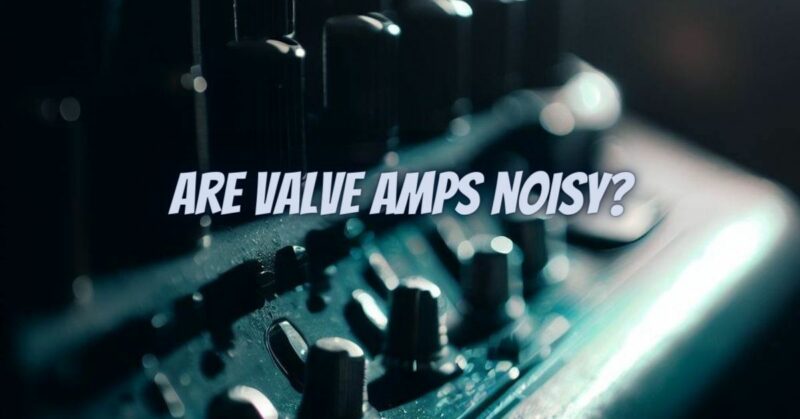Valve amps are generally noisier than solid-state amps for a number of reasons. Vacuum tubes, the key components in valve amps, are inherently noisy devices. They produce a certain amount of hiss, even when they are not being used to amplify a sound signal. This hiss is caused by the random movement of electrons inside the tubes. Vacuum tubes can also produce a humming sound, which is caused by the alternating current (AC) power that is used to heat the tubes. Finally, valve amps are more susceptible to microphonics, a phenomenon that occurs when sound vibrations are transmitted to the vacuum tubes. This can cause the tubes to produce unwanted noise.
The amount of noise produced by a valve amp will vary depending on a number of factors, including the type of amp, the quality of the components, and the way the amp is set up. Some valve amps are designed to be quieter than others, and high-quality components will help to reduce noise. However, even the best valve amps will produce some noise.
There are a few things that can be done to reduce noise in a valve amp:
- Choose the right amp: Some valve amps are designed to be quieter than others. When choosing a valve amp, it is important to consider the noise level of the amp.
- Use high-quality components: High-quality tubes, transformers, and capacitors will help to reduce noise in the amp.
- Set up the amp properly: The way the amp is set up can also affect the noise level. For example, setting the gain too high can increase the noise level.
If you are concerned about noise in your valve amp, it is a good idea to talk to a qualified technician. They can help you to choose the right amp and components, and they can help you to set up the amp properly to reduce noise.
In addition to the factors listed above, there are a few other things to keep in mind when considering valve amp noise:
- The type of music you play: Some genres of music, such as metal or hard rock, require a lot of gain or distortion. This can increase the noise level of a valve amp.
- The environment: Valve amps can be more susceptible to noise in noisy environments, such as clubs or bars.
- Your own personal preferences: Some people are more tolerant of noise than others. It is important to find a valve amp that produces a level of noise that is acceptable to you.
Ultimately, the decision of whether or not to buy a valve amp is a personal one. Valve amps offer a number of advantages over solid-state amps, including warmer sound, better responsiveness, and greater harmonic complexity. However, they are also noisier than solid-state amps. If you are considering buying a valve amp, it is important to weigh the pros and cons carefully.
Here are some additional tips for reducing noise in a valve amp:
- Use a noise gate: A noise gate is an electronic device that can be used to reduce noise in a signal chain. Noise gates work by muting the signal when it falls below a certain level. This can help to reduce hiss and hum from a valve amp.
- Use shielded cables: Shielded cables can help to reduce noise and interference from other electronic devices.
- Place the amp in a good location: Avoid placing the amp near other electronic devices or in areas with high levels of vibration.
- Keep the amp clean: Dust and dirt can build up on the tubes and other components of a valve amp, which can increase noise. It is important to clean the amp regularly to remove dust and dirt.
By following these tips, you can help to reduce noise in your valve amp and get the most out of your tone.


